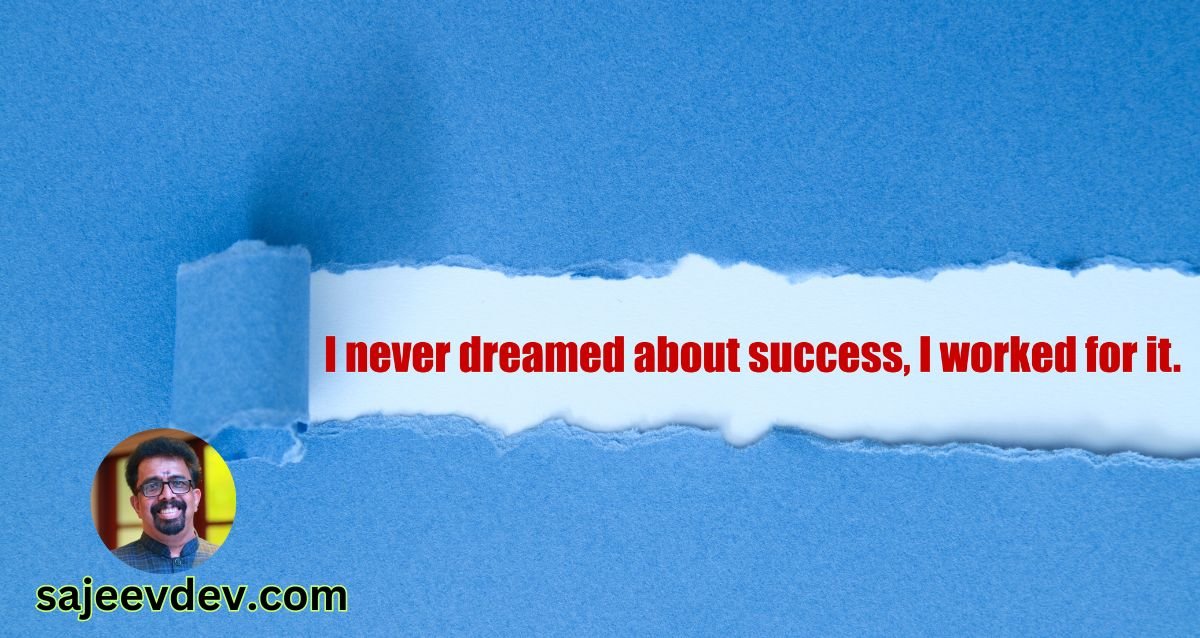In an age characterized by rapid change and plentiful opportunities
In an age characterized by rapid change and plentiful opportunities, the notion of achieving success might appear to many as an elusive dream perpetually out of reach. Yet, it is crucial to understand that genuine accomplishments are born not from idle dreaming but from unwavering dedication and relentless effort. The core thesis of this blog is to underscore the significance of hard work as the paramount factor in realizing one’s aspirations.
While dreams can ignite our passions and set our aspirations in motion, they must be coupled with disciplined labor and a persistent pursuit of goals. The glamorized success stories that dominate media often overshadow the gritty, day-to-day toil that underpins real achievements. By focusing on the value of effort, this blog aims to provide a realistic perspective on what it takes to turn dreams into tangible results.
This journey is not bereft of obstacles. Each setback encountered should be perceived not as a deterrent but as an opportunity to build resilience and fortify one’s determination. The following sections will delve into various strategies, anecdotes, and insights that emphasize the supremacy of work over wishful thinking, illustrating that success is not a serendipitous event but a product of consistent hard work.
The Myth of Overnight Success
The concept of “overnight success” often captivates public imagination, but it is, more often than not, a fallacy. The truth is that most celebrated achievements are the result of years of arduous work, persistence, and a litany of small wins that build up over time. To fully appreciate the journey towards success, it is imperative to look behind the curtains and understand the relentless efforts that precede the breakthrough moments.
Consider the narratives of influential entrepreneurs and renowned personalities. For instance, Steve Jobs, co-founder of Apple Inc., is frequently lauded for his revolutionary impact on technology. However, his trajectory was anything but instant. From the days of working in his parents’ garage to being ousted from the company he founded, Jobs’ ascent was marred with challenges and setbacks. It’s this relentless drive and dedication over years that eventually led him to reshape the technological landscape.
Another compelling example is J.K. Rowling, author of the Harry Potter series. Before her books became a global phenomenon, she faced a barrage of rejections from multiple publishers. Living as a single mother on state benefits, Rowling devoted countless hours to crafting her manuscripts, displaying remarkable tenacity and commitment. Her “overnight success” was actually built upon years of quiet labor and resilience.
Similarly, the co-founder of Alibaba, Jack Ma, embodies the essence of long-term perseverance. Ma faced numerous entrepreneurial failures and rejections, including being turned down for jobs at even menial levels. His unflagging perseverance over years of struggle eventually culminated in the creation of one of the world’s most valuable companies.
These anecdotes are a stark reminder that the term “overnight success” is largely a myth. The perceived sudden breakthroughs are usually the visible tips of vast icebergs of relentless work, strategic planning, and sustained effort. Understanding this reality helps dispel the misleading allure of instant success and highlights the importance of steadfast effort and determination over time.
Setting Realistic Goals
Success doesn’t happen overnight; it is the result of diligent planning and execution. One of the most critical initial steps toward achieving success is setting realistic goals. Understanding and implementing goal-setting techniques can make the path to success more navigable and less daunting.
The SMART criteria provide a framework to establish goals that are Specific, Measurable, Achievable, Relevant, and Time-bound. By making your goals specific, you clearly define what you want to achieve, leaving little room for ambiguity. For example, instead of aiming to “improve your skills,” a specific goal would be “complete an advanced course in project management.”
A goal must be measurable, providing a way to track progress and stay motivated. Measurable goals have concrete criteria for success, such as aiming to “increase sales by 20% over the next quarter.” This quantifiable target allows for ongoing assessment and adjustment if needed.
Achievability is another important aspect. Goals should challenge you but also be realistic enough to be attained. Setting overly ambitious targets can lead to frustration, diminishing motivation rather than fostering it. Assessing your current resources and capabilities can help in setting goals that are within reach.
Relevance ensures that your goals are aligned with broader life or business objectives. This alignment guarantees that every step you take is pushing you closer to your overarching aims rather than diverting time and energy into areas that do not contribute to your ultimate success.
Lastly, having goals that are time-bound instills a sense of urgency and aids in prioritizing tasks. A defined timeline, such as achieving a goal within six months or by the end of the year, adds an element of accountability and helps maintain focus.
Moreover, breaking down larger objectives into smaller, manageable tasks is essential. This approach not only makes the goals less overwhelming but also allows for celebrating small wins along the way, maintaining motivation and momentum. For instance, if your larger goal is to launch a new product, smaller tasks might include conducting market research, designing the product, and formulating a marketing strategy.
By setting SMART goals and breaking them down into smaller tasks, you lay a solid foundation for your journey toward success. This structured approach ensures that your efforts are purposeful and aligned, making the seemingly impossible achievable, one step at a time.
Building a Work Ethic
A robust work ethic is foundational to achieving success. Central to this ethic are key elements such as discipline, responsibility, and consistency. Discipline ensures that individuals remain focused on their tasks and goals, helping them to resist distractions and maintain a steady course of action. Responsibility, on the other hand, is the acknowledgment of one’s duties and the commitment to fulfilling them diligently. Consistency binds these elements together, enabling a continuous and steady effort toward success.
Developing and maintaining a strong work ethic requires intentional effort. One effective strategy is time management. By planning how to allocate time optimally, individuals can address tasks efficiently and avoid wasting precious minutes. Creating a daily or weekly schedule can aid in identifying high-priority tasks and ensuring that time is spent productively.
Prioritizing tasks is another critical aspect. Not all tasks hold the same weight in terms of impact or urgency. Utilizing methods such as the Eisenhower Matrix can help in distinguishing between what is urgent and important, ensuring that focus is directed toward tasks that significantly contribute to success. This approach minimizes the risk of spending time on trivial tasks and maximizes productivity.
Avoiding procrastination is a common challenge that must be addressed to maintain a solid work ethic. Procrastination often stems from feelings of being overwhelmed, unfamiliarity with tasks, or simply a lack of motivation. Tackling this issue requires breaking tasks into smaller, manageable chunks, setting clear and attainable goals, and using techniques such as the Pomodoro Technique to maintain focus. Additionally, external accountability, whether through a mentor, peer, or technology, can provide the necessary push to overcome procrastination.
Ultimately, by incorporating strategies such as effective time management, task prioritization, and techniques to avoid procrastination, individuals can nurture and sustain a strong work ethic, paving the road towards lasting success.
Harnessing the Power of Persistence
Persistence and resilience stand as cornerstones of success, often distinguishing those who achieve their goals from those who falter. These attributes involve unwavering determination and the ability to bounce back from setbacks, a process that demands both mental fortitude and practical strategies. Successful individuals frequently attribute their accomplishments not to innate talent, but to their relentless perseverance in the face of adversity.
Consider the story of Thomas Edison, who famously endured thousands of failed attempts before successfully inventing the lightbulb. Each failure was not a setback but a step closer to success. Edison’s unyielding persistence illustrates that initial failures can serve as critical learning opportunities. Similarly, J.K. Rowling faced numerous rejections from publishers before “Harry Potter” became a global phenomenon. Her journey underscores the importance of resilience and the understanding that rejection is not a reflection of one’s worth or potential but rather a challenge to be overcome.
To cultivate a persistent mindset, individuals can adopt several practical approaches. Setting clear, attainable goals can provide a roadmap to follow and milestones to celebrate along the way. Breaking larger objectives into manageable tasks prevents overwhelm and facilitates a sense of progress. Additionally, maintaining a positive outlook, even during challenging times, can keep motivation levels high. Surrounding oneself with supportive mentors and peers also serves as a critical source of encouragement and guidance.
Strategies for staying motivated during difficult periods include reflecting on past achievements to reinforce one’s capability to succeed and revisiting the reasons behind one’s goals to rekindle purpose and passion. Additionally, embracing a growth mindset, where challenges are viewed as opportunities for development rather than insurmountable obstacles, can foster resilience. Regularly assessing and adjusting goals ensures they remain realistic and aligned with evolving circumstances, preventing unnecessary discouragement.
Ultimately, harnessing the power of persistence involves a combination of strategic planning, a resilient mindset, and unwavering dedication. Taking inspiration from those who have triumphed against the odds can provide both motivation and a blueprint for perseverance, highlighting that success is not merely a dream but the result of relentless effort and steadfast resolve.
Learning from Failure
Failure is often an unavoidable companion on the journey toward success. Contrary to popular belief, it is not a marker of defeat but an integral component of the learning process. Many successful individuals attest that their failures have provided significant insights, helping them to refine their strategies and bolster their resolve. Embracing failure as a learning tool enables growth and development, transforming apparent setbacks into stepping stones for future accomplishments.
To effectively learn from failure, it is crucial to analyze and understand its root causes. This involves a thorough examination of what went wrong and identifying any actions or decisions that contributed to the undesired outcome. By dissecting failures without bias or emotional interference, one can extract valuable lessons that provide guidance for subsequent efforts. This analytical approach allows individuals to pinpoint weaknesses, recognize patterns, and avoid making similar mistakes in the future.
One strategy to maximize learning from failure is to implement a reflective practice. This practice demands that, following any significant setback, individuals take time to reflect on the experience. They should document their thoughts, emotions, and any insights gained, thus creating a repository of lessons learned. This written record can be revisited when faced with similar challenges, serving as a personal guide to navigating future obstacles more effectively.
Another beneficial approach is to seek feedback from others. By engaging mentors, colleagues, or peers in discussions about the failure, one can gain diverse perspectives that may not have been initially apparent. This external input can reveal hidden aspects of the failure and generate innovative solutions for future endeavors.
Ultimately, the process of learning from failure is about transforming a seemingly negative experience into a powerful educational opportunity. By embracing failure, analyzing its causes, reflecting on its lessons, and seeking feedback, individuals can build resilience and adaptability, setting the stage for sustained success in their pursuits.
The Role of Continuous Learning
Continuous learning serves as a critical cornerstone in the quest for long-term success. In a rapidly evolving world, skills and knowledge can become outdated quickly, making it imperative to engage in lifelong learning to stay relevant and competitive. By embracing continuous self-improvement, individuals can navigate their careers with adaptability and foresight.
One effective method for ongoing education is through extensive reading. Literature, be it books, articles, or research papers, offers a wealth of information and diverse perspectives, aiding in intellectual growth and expanding one’s understanding of various subjects. Reading not only enhances knowledge but also stimulates critical thinking and creativity, skills essential for problem-solving and innovation.
Attending workshops and seminars is another valuable avenue for continuous learning. These events provide practical insights and up-to-date knowledge straight from industry experts. Workshops offer a hands-on learning experience, often addressing real-world challenges and solutions, thus equipping attendees with applicable skills and techniques.
Mentorship is equally vital in fostering continuous learning. A mentor can offer personalized guidance, share valuable experiences, and provide constructive feedback, which is instrumental for personal and professional development. Mentorship relationships can also open doors to networking opportunities, helping mentees to build connections that may further their careers.
Staying abreast of industry trends is crucial for maintaining a competitive edge. Regularly following industry news, subscribing to relevant journals, and participating in professional associations ensure that one remains informed about the latest advancements and shifts in their field. This awareness can inspire strategic decisions and encourage proactive adjustments to new developments.
Ongoing education and self-improvement not only pave the way for new opportunities but also instill a sense of confidence and self-efficacy. The knowledge and skills acquired through continuous learning empower individuals to take on new challenges and excel in their endeavors. Therefore, making a commitment to lifelong learning is a strategic investment in one’s future success.
Celebrating Small Wins
Recognizing and celebrating small milestones is an integral element on the path to success. While the ultimate goal is important, acknowledging minor achievements along the way serves to boost morale and sustain motivation. Small wins act as stepping stones, giving us tangible proof of progress and encouraging perseverance. By celebrating these incremental victories, individuals can maintain a positive mindset and stay focused on the broader objective.
For instance, in a professional setting, completing a challenging project or surpassing a monthly sales target can be seen as a small win. Celebrating these achievements might involve a team acknowledgment during a meeting, a congratulatory email, or even a small reward. On a personal level, small wins could include mastering a new skill, sticking to a fitness routine, or maintaining a daily commitment. Simple celebrations, such as treating oneself to a favorite activity or sharing success with friends and family, can reinforce the accomplishment.
Importantly, celebrating small wins should not distract from the end goal. The key lies in balancing recognition and maintaining the pursuit of long-term objectives. Establishing a system for tracking progress and periodically reviewing achievements can help keep the larger vision in sight while fostering continuous motivation. This balanced approach ensures that each small win contributes meaningfully to the journey toward ultimate success.
Overall, the practice of celebrating small wins reinforces the idea that success is a journey replete with incremental achievements. Recognizing these milestones not only enhances morale but also affirms that hard work is paying off. Embracing small victories can create a positive feedback loop, further driving individuals toward their eventual goals.









